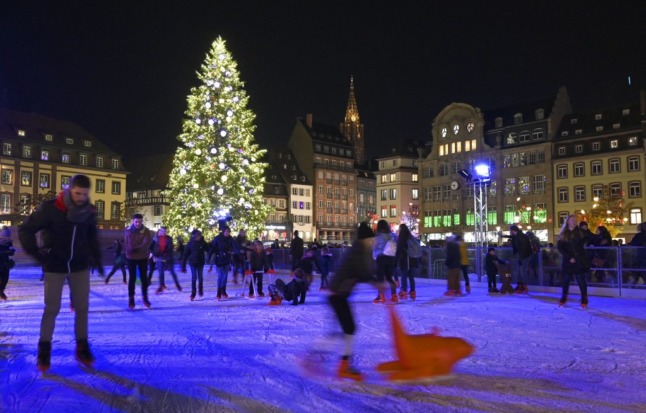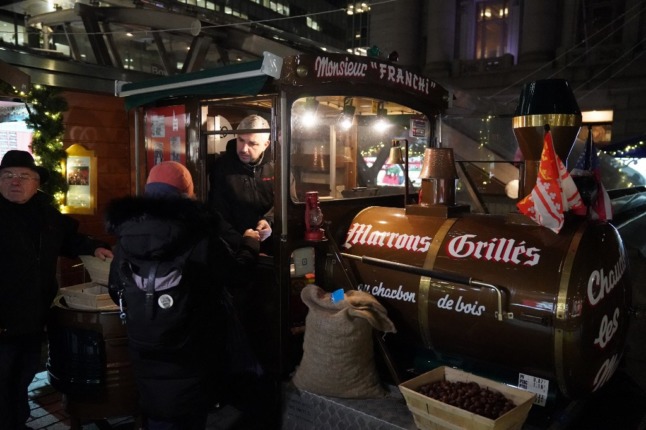Strasbourg
The oldest and most famous market in France is back after it was cancelled last year.
Every year the Christkindelsmärik in Strasbourg gathers around 2 million visitors who come from all across the world to visit the 300 wonderfully decorated wooden chalets.
Let yourself be taken away by the typical smells of pain d’épices, marrons chauds and vin chaud (gingerbread, roasted chestnuts and mulled wine) and the traditional Alsatian decorations.
There are also many different shows, musical concerts and artistic performances.
A health pass won’t be required for entry but wearing a mask will be mandatory. Unlike previous years where visitors were able to enjoy a traditional pretzel or a vin chaud in front of the chalets, eating and drinking will only be possible at the “food corners” set up for the occasion. There will also be heightened security in place after the 2018 market was the subject of a terror attack.
Dates: November 26th until December 26th.
Find out more here.
Colmar
If you’re looking for a traditional Alsatian Christmas market, Colmar is the go-to.
With 6 markets and 186 tiny Alsatian houses, the festive event will honour the region’s specialties with offerings such as Foies gras, choucroutes and pains d’épice. French chefs will also host culinary shows and winemakers from Colmar will showcase their products.
A children’s market in Petite Venise will include a giant letter box for posting a wish-list to Santa and a 800 square metre ice rink will be set up.
The whole city will be illuminated with 25 kilometres of Christmas lights.
A health pass won’t be required apart from to access the “gourmand market”.
Dates: from November 26th until December 29th.
Find out more here.

Eguisheim
South of Colmar, this medieval city with colourful Alsatian houses around the castle is a must-see in the region. Its authentic and traditional Christmas market is an opportunity to discover the local gastronomic products and enjoy a glass of vin chaud with the villagers.
If you stumble upon the Veilleur de Nuit with his accordionist, he’ll invite you to join him for a tour of the picturesque and illuminated streets and tell you all about the village history and its Christmas traditions.
Dates: from November 26th until December 23th.
Find out more here.
Kaysersberg
Situated 12km away from Colmar, Kaysersberg is one of the most beautiful villages of Alsace. The Christmas market is located in the historical centre, next to the ruins of the castle, which are illuminated for the occasion.
The wooden bungalows sell typical decorations and local arts and crafts. There will also be plenty of Alsatians specialties and products from the Kaysersberg valley such as honey, charcuterie or eau de vie.
Dates: open on November 26th to 28th, December 3rd to 5th, 10th to 12th and 17th to 21th.
Find out more here.
Mulhouse
The particularity of Mulhouse’s Christmas market is that it happens in a setting made of Christmas fabric. In fact, thousands of metres of Christmas cloth decorate the frontages, monuments and pedestrian streets in the city’s historical centre.
A tour on the Ferris wheel will give you a chance to get a wonderful view of the Christmas market and of its wooden bungalows.
It’ll also be an opportunity to try Alsatian sweets such as the Berawecka – a spongy cake with pears, plums, figs and kirsch – or the Pebkucha – a cake with honey and spices – and get handcrafted products such as wooden toys or Christmas decorations.
Dates: from November 24th until December 27th.
Find out more here.

Reims
In addition to its traditional gastronomic and handmade products, the Christmas market of Reims will offer several musical performances with a jazz group playing on Wednesday and Friday afternoons and various groups playing every Saturday and Sunday afternoons.
A light and sound show on the façade of the ancient Cathedral will also revisit the history of French royalty on Saturdays (December 11th and 18th) and Sundays (December 12th and 19th) at 7:30pm.
A Ferris wheel, a night torchlight walk and other fun activities for children are also on the programme.
Dates: from November 26th until December 29th.
Find out more here.
Montbéliard
Montbéliard, a city in eastern France at the border with Switzerland, calls its market “the Lights of Christmas”. During the advent period, its picturesque city centre is illuminated with 115,000 lights.
The market gathers 160 craftsmen who sell authentic and traditional products. The good fairy of the Pays de Montbéliard Aunt Airie keeps local traditions going by telling her story to the children.
Children will also be able to attend the Petits Lutins workshops where they’ll make the essential accessories for a successful Christmas before enjoying a hot chocolate.
Dates: from November 27th until December 28th.
Find out more about the festive event here.
Amiens
For more than 20 years, Amiens has been offering a flamboyant Christmas market which competes with the famous Alsatian markets.
There you’ll find local and gastronomic products as well as Christmas decorations, but what makes this market so magical are its animations, its enchanting shop windows and its mountain village with a sledge run in the middle of a pine forest.
Don’t miss the bewildering lights and sound night show on the Notre-Dame cathedral.
Dates: from November 26th until December 30th.
Find out more here.
Lille
Lille’s enchanting Christmas market is coming back this year after it was cancelled in 2020 due to the health situation.
About 90 stalls will offer traditional goodies such as pain d’épices, vin chaud and tartiflette. But there will also be plenty of gift ideas as well as the possibility to buy tree ornaments and nativity figures.
Children will also be able to attend workshops where they’ll learn how to make a Christmas ornament or get festive make-up.
Don’t miss a chance to enjoy a ride on the Ferris wheel and enjoy fantastic views over Lille’s Flemish-Renaissance architecture, illuminated with Christmas fairy lights.
Dates: from November 19th until December 29th.
Find out more here.
Arras
Every year, the city gets into the Christmas spirit with its red carpet and its forest of green, white and red pines.
With its 140 stalls, the market offers a selection of handmade jewellery, wooden toys or ceramic decorations. You’ll also find Christmas decorations with ornaments but also typical candles and music boxes.
Enjoy local food specialties and don’t miss a ride on the Ferris wheel or a spin around the ice rink.
Dates: from December 3rd to January 2nd.
Find out more here.
Lyon
On a slightly different note, Lyon’s Fête des Lumières (lights festival) is a magnificent event which has made the reputation of the city.
Over four days at the beginning of December, the Fête des Lumières invites more than 3 million visitors from across the world to enjoy enchanting walks in a setting of 46 lights and sound creations.
There’s also a more traditional Christmas market with 90 illuminated chalets which offer local products and arts and crafts. Lyon is known as the foodie capital of France, so enjoy superior food at the market including tartiflette, aligot à la truffe (mashed potatoes with truffle and melted cheese) oysters and escargots (snails).
Dates: Fête des Lumières is from December 8th to 11th, and the Christmas market from November 27th until December 24th.
Find out more about the festival of lights here and about the Christmas market here.



 Please whitelist us to continue reading.
Please whitelist us to continue reading.
Member comments